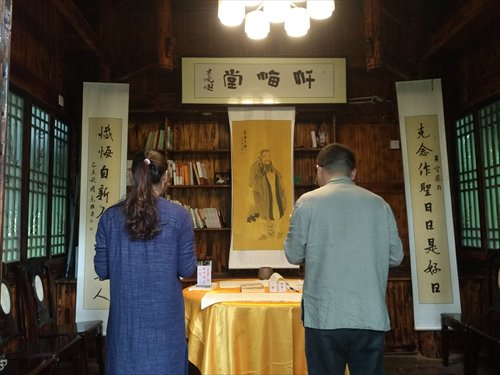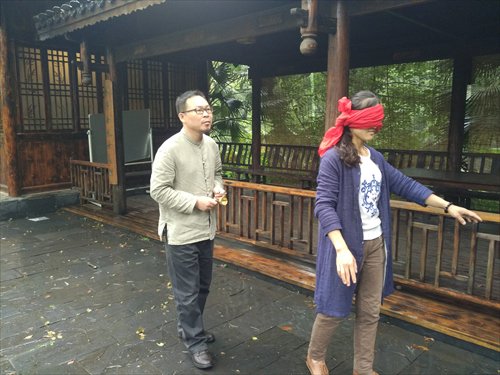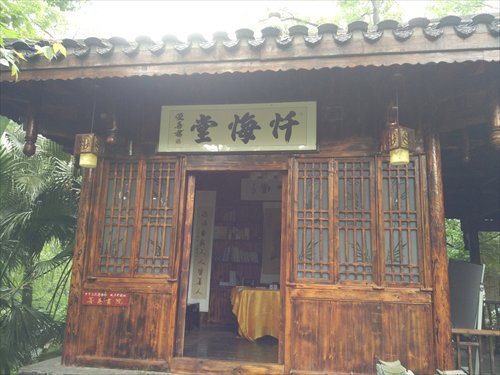Controversial scholar promotes Confucian idea of repentance

Huang Shouyu (right) reads confession text with a confessor, posed by a worker at his shuyuan, in front of a picture of Confucious. Photo: Huang Jingjing/GT
Wash your hands, walk blindfolded, read a script aloud, bow to a picture of Confucius and then burn the script - that is the way to carry out a proper and complete confession, according to Huang Shouyu, a Confucian scholar from Changsha, Central China's Hunan Province.
In his Confession Room, a wooden house surrounded by trees and bushes at a hilltop in the Hunan Martyrs' Commemorative Park in Changsha, Huang stated his ambition of promoting classical Chinese confession culture to the world.
"The Confucian idea of repenting and reforming oneself is a self-review system of one's own behavior and knowledge. It is not only conducive to self-cultivation, but also helps to moderate family and social conflicts," said the 38-year-old scholar.
Some are skeptical. "Repentance can only be a moral redemption. It is impossible to attain salvation for serious offenses and crimes," said an unnamed commentator in a post recently published on dtsxw.org, a website committed to spreading traditional culture.
"Confession may just be self-deceiving unless the error is a small one," the author commented.

Demonstration of walking blindfolded Photo: Huang Jingjing/GT
Loss of heritage
Born into a family of scholars in Yiyang, Hunan, Huang has had an interest in classical literature since childhood. A Chinese Literature graduate of Changde Normal University, he has devoted his time to researching ancient culture and writing books.
Co-managing a shuyuan, an academy of classical learning in Changsha, he has become one of many people who have voiced concerns about Chinese moral decline and the intrusion of Western culture, and called for the revival of the country's cultural legacy.
According to his research, the custom of confession has lasted for thousands of years. But due to ideological campaigns rejecting traditional thinking and the rise of atheism in the last century, confession culture has faded with some other aspects of China's cultural heritage.
"We hope to revive it among ordinary people. It resembles the self-criticism of the Communist Party of China," he said. "We encourage individuals to do the confession voluntarily."
In August last year, the Confession Room was officially opened. Huang and his followers had been promoting it on social media and online communities.
To formalize the act of confession, he wrote a confession text and created a ceremony. "Repenting can relieve all pains, reforming oneself can give you happiness," read the script written in traditional Chinese.
In the 800-character long script, there are several blanks where the confessor has to fill in his name, sins and who he is confessing to before reading it aloud.
Before entering the room to read the script, the confessor needs to take a short walk in the open yard outside blindfolded with a red scarf, while Huang rings a bell about every 20 seconds beside him.
"The confessors made errors because they were blinded by something evil. The walk allows them to feel the fear of actual blindness, so as to realize how bad it was to do wrong," Huang explained.
All the services are free of charge, he insists. His funding mainly comes from donations and revenues from managing the shuyuan, as well as book sales, he said.
According to Huang, about 20,000 people have carried out confessions at the Confession Room.

The Confession Room Photo: Huang Jingjing/GT
Challenging the tradition
Huang rose to notoriety in 2006 for posting articles that carried some astonishing assertions, including that Chinese were descendants of the wild boar, drawing outrage then.
The Chinese custom of worshiping the boar came much earlier than the dragon, he argued in his article, citing many ancient writings.
"I came to those views through historical research, not as a stunt or to seek overnight attention," he responded.
Inspired by Chen Yinque (1890-1969), one of the most original and creative historians in 20th century China, he has been thinking independently and critically in his studies of ancient literature, he explained.
But at the same time, he is a firm defender of tradition. He has called for the revival of traditional Chinese, and for the name Chunjie (Spring Festival) to revert to Yuandan, the traditional name for the first day of the Chinese lunar new year.
In recent years, however, he has stopped making such "extreme" statements and focused on reviving Confucianism. In December last year, the book New Confucianism that he compiled was published, with his confession text attached to it.
Good for the soul
Many prominent figures have lauded what Huang is doing. Several scholars including Deng Yuwen, an independent political commentator, says that Chinese lack the consciousness for repenting. "Chinese people are good at accusing. Every time after a disaster, many pour their grievances to the world, but confessors are few," Deng said in an article in early 2014.
Jiang Jingsong, an associate professor of scientific philosophy with the Tsinghua University, believes it is a good thing to promote confession.
"I'm a Buddhist and we confess every day as part of our practice. It's essential for purifying morality," Jiang told the Global Times. "But I don't support making confession into a show, which is strange and fake."
Huang said the ceremony is not essential for confessors and they don't compel people to do so.
The confession room has also attracted some foreigners, including Martin Haase, a member and coach of the Changsha Tai Chi Association.
Haase visited the room last year after learning about it from a friend. Although the ceremony seemed "foreign" and was "slightly unnatural" when he bowed to a picture of Confucius, he felt that "it is a good thing for people, teaching self-awareness of the impact of our words and actions."
Huang plans to internationalize the Confucian way of confession.
He said several people from other provinces have asked to open confession room branches, an idea which he has rejected. "I'm cautious in expanding the service. I'm still improving its management so as to avoid it turning into a cult," he noted.
He revealed that he intends to build boards of directors and supervisors, and if the conditions allow, they will apply to set up a Party committee.
Newspaper headline: The art of confession